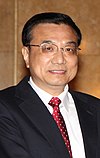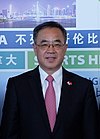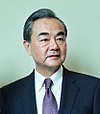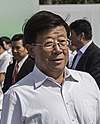State Council of the People's Republic of China
| 中华人民共和国国务院 Zhōnghuá Rénmín Gònghéguó Guówùyuàn | |
 | |
| Agency overview | |
|---|---|
| Formed | 27 September 1954 |
| Preceding agency | |
| Type | Executive branch of the central government Executive body of the National People's Congress[2] Highest organ of State administration[2] |
| Jurisdiction | Government of the People's Republic of China |
| Headquarters | State Council Hall, Zhongnanhai, Beijing |
| Motto | "Serve the People" |
| Annual budget | CN¥37.2 trillion (2019)[1] |
| Agency executives |
|
| Child agencies |
|
| Website | english.gov.cn |
| State Council of the People's Republic of China | |||
|---|---|---|---|
| Simplified Chinese | 中华人民共和国国务院 | ||
| Traditional Chinese | 中華人民共和國國務院 | ||
| Literal meaning | "Chinese People('s) Republic State Affair(s) Court" | ||
| |||
| State Council (commonly used abbreviation) | |||
| Simplified Chinese | 国务院 | ||
| Traditional Chinese | 國務院 | ||
| Literal meaning | "The Court of State Affairs" | ||
| |||
| Central People's Government (Constitutional synonym[2]) | |||
| Chinese | 中央人民政府 | ||
| Literal meaning | Central People('s) Government | ||
| |||
Politics of China |
|---|
 |
|
The State Council, constitutionally[2] synonymous with the Central People's Government since 1954 (particularly in relation to local governments), is the chief administrative authority of the People's Republic of China.[3] It is chaired by the premier and includes the heads of each of the cabinet-level executive departments.[4] Currently, the council has 35 members: the premier, one executive vice premier, three other vice premiers, five state councillors (of whom three are also ministers and one is also the secretary-general), and 26 in charge of the Council's constituent departments.[5] In the politics of the People's Republic of China, the Central People's Government forms one of three interlocking branches of power, the others being the Chinese Communist Party (CCP) and the People's Liberation Army (PLA). The State Council directly oversees the various subordinate People's Governments in the provinces, and in practice maintains membership with the top levels of the Chinese Communist Party.
Organization[]
The State Council meets every six months. Between meetings it is guided by a Standing Committee of the State Council of the People's Republic of China (Executive Meeting) that meets weekly. The standing committee includes the premier, one executive vice premier, three vice premiers, and five other state councillors (normally one of whom serves as Secretary-General of the State Council, and two of whom concurrently serve as ministers).
The vice-premiers and state councillors are nominated by the premier, and appointed by the president with National People's Congress' (NPC) approval. Incumbents may serve two successive five-year terms.
Each vice premier oversees certain areas of administration. Each State Councillor performs duties as designated by the Premier. The secretary-general heads the General Office which handles the day-to-day work of the State Council. The secretary-general has relatively little power and should not be confused with the General Secretary of the Chinese Communist Party.
Each ministry supervises one sector. Commissions outrank ministries and set policies for and coordinate the related activities of different administrative organs. Offices deal with matters of ongoing concern. Bureaus and administrations rank below ministries.
In addition to the 25 ministries, there are 38 centrally administered government organizations that report directly to the state council. The heads of these organizations attend full meetings of the state committee on an irregular basis.
In practice, the vice premiers and State Councillors assume responsibility for one or more sectors or issues, and remain in contact with the various bodies responsible for policy related to that area. This allows the Standing Committee to oversee a wide range of government functions.
The State Council, like all other governmental bodies, is nominally responsible to the NPC and its Standing Committee in conducting a wide range of government functions both at the national and at the local levels, and nominally acts by virtue of the NPC's authority. In practice, however, the NPC had historically done little more than ratify decisions already made by the State Council. More recently, however, the NPC has taken on a more independent role. There has been at least one case where the NPC has outright rejected an initiative of the State Council and a few cases where the State Council has withdrawn or greatly modified a proposal in response to NPC opposition.
The State Council and the Chinese Communist Party are also tightly interlocked. With rare exceptions, State Councillors are high-ranking members of the CCP. Although, as Party members, they are supposed to follow Party instructions, because they tend to be senior members of the Party they also have substantial influence over what those instructions are. This results in a system which is unlike the Soviet practice in which the Party effectively controlled the State. Rather, the Party and State are fused at this level of government. The members of the State Council derive their authority from being members of the state, while as members of the Party they coordinate their activities and determine key decisions such as the naming of personnel.
There were attempts to separate the party and state in the late 1980s under Deng Xiaoping and Zhao Ziyang and have the Party in charge of formulating policy and the State Council executing policy, but these efforts were largely abandoned in the early 1990s.
As the chief administrative organ of government, its main functions are to formulate administrative measures, issue decisions and orders, and monitor their implementation; draft legislative bills for submission to the NPC or its Standing Committee; and prepare the economic plan and the state budget for deliberation and approval by the NPC. The State Council is the functional center of state power and clearinghouse for government initiatives at all levels. With the government's emphasis on economic modernization, the State Council clearly acquired additional importance and influence.
The State Council controls the Ministry for National Defense but does not control the People's Liberation Army, which is instead controlled by the Central Military Commission.
Members[]
Executive Meeting (Standing Committee)[]
| # | Portrait Name |
Birth year |
Government posts | Duties | Party | Party positions | Functional roles | |
|---|---|---|---|---|---|---|---|---|
| 1 |  Li Keqiang 李克强 |
1955 | Premier | Overall work of the State Council | CCP | Member, 19th PSC Secretary, |
Deputy Chairman, Director, Central Institutional Organization Commission Director, National Defense Mobilization Commission Director, National Energy Commission | |
| 2 |  Han Zheng 韩正 |
1954 | Vice Premier
(first-ranked) |
Develop & reform, institutional reform, etc. | CCP | Member, 19th PSC Deputy Secretary, |
||
| 3 |  Sun Chunlan 孙春兰 (female) |
1950 | Vice Premier | Education, health, sport, etc. | CCP | Member, 19th Politburo Member, |
副组长 组长 主任 主任 主任 Leader, Leading Group for China Football Reforms | |
| 4 |  Hu Chunhua 胡春华 |
1963 | Vice Premier | Agricultural and rural affairs, poverty alleviation, water resources, foreign trade | CCP | Member, 19th Politburo Member, |
总指挥 指挥长 组长 | |
| 5 | Liu He 刘鹤 |
1952 | Vice Premier | Finance, science and technology, industry and transport | CCP | Member, 19th Politburo Member, |
Director of the Central Financial and Economic Affairs Commission Office | |
| 6 |  General Wei Fenghe 魏凤和 |
1954 | State Councillor and Minister of National Defense | National defense mobilization, etc. | CCP | Member, 19th Central Committee Member, Member, Central Military Commission |
Member, Central Foreign Affairs Commission Director, | |
| 7 | Wang Yong 王勇 |
1955 | State Councillor | Emergency management, etc. | CCP | Member, 19th Central Committee Member, |
成员 副主任 主任 主任 主任 | |
| 8 |  Wang Yi 王毅 |
1953 | State Councillor and Minister of Foreign Affairs | Foreign affairs | CCP | Member, 19th Central Committee Member, |
Member, Central Foreign Affairs Commission | |
| 9 |  Xiao Jie 肖捷 |
1957 | State Councillor and Secretary-General of the State Council | In charge of the General Office | CCP | Member, 19th Central Committee Member, Secretary, |
||
| 10 |  Zhao Kezhi 赵克志 |
1953 | State Councillor and Minister of Public Security | Public security, etc. | CCP | Member, 19th Central Committee Member, |
Member, Central Political and Legal Affairs Commission Member, 主任 组长 副主任 | |
Plenary Meeting[]
The Plenary Meeting of State Council is hosted by the Premier, joined by Vice Premiers, State Councillors, Ministers in charge of Ministries and Commissions, the Governor of the People's Bank, the Auditor-General, and the Secretary General. It usually runs bi-annually and when necessary, non-members can be invited to participate.
Organizational structure[]
General Office of the State Council[]
Constituent Departments of the State Council (cabinet-level)[]
| # | Logo | Name of Department | Year Established | Current Chief | Party | Reports To | |
|---|---|---|---|---|---|---|---|
| 1 | 
|
Ministry of Foreign Affairs 外交部 |
1949 (of CPG) 1954 (of PRC) |
Wang Yi 王毅 State Councillor and Minister of Foreign Affairs |
CCP | General Secretary Xi Jinping (Director of the Central Foreign Affairs Commission) ∟ Yang Jiechi (Director of the CFAC Office) | |
| 2 | 
|
Ministry of National Defense 国防部 |
1954 (of PRC) | General Wei Fenghe 魏凤和 (Member of the Central Military Commission) State Councillor and Minister of National Defense |
CCP | General Secretary Xi Jinping (Chairman of the Central Military Commission) | |
| 3 | 
|
National Development and Reform Commission (NDRC) 国家发展和改革委员会 |
2003 | He Lifeng 何立峰 (Vice-Chairman of the CPPCC National Committee) Minister in charge of the National Development and Reform Commission |
CCP | Vice-Premier Han Zheng | |
| 4 | 
|
Ministry of Education (MOE) 教育部 |
1949 (of CPG) 1954 (of PRC) |
Chen Baosheng 陈宝生 Minister of Education |
CCP | Vice-Premier Sun Chunlan | |
| 5 | 
|
Ministry of Science and Technology 科学技术部 |
1998 | Wang Zhigang 王志刚 Minister of Science and Technology |
CCP | Vice-Premier Liu He | |
| 6 | Ministry of Industry and Information Technology (MIIT) 工业和信息化部 |
2008 | 肖亚庆 Minister of Industry and Information Technology |
CCP | |||
| 7 | 
|
National Ethnic Affairs Commission (NEAC) 国家民族事务委员会 |
1949 (of CPG) 1954 (of PRC) |
陈小江 Minister in charge of the National Ethnic Affairs Commission |
CCP | You Quan (Head of the CCP Central Committee United Front Work Department) | |
| 8 | 
|
Ministry of Public Security (MPS) 公安部 |
1949 (of CPG) 1954 (of PRC) |
Zhao Kezhi 赵克志 State Councillor and Minister of Public Security |
CCP | Guo Shengkun (Secretary of the CCP Central Political and Legal Affairs Commission) | |
| 9 | 
|
Ministry of State Security (MSS) 国家安全部 |
1983 | Chen Wenqing 陈文清 Minister of State Security |
CCP | ||
| 10 | 
|
Ministry of Civil Affairs (MCA) 民政部 |
1978 | Li Jiheng 李纪恒 Minister of Civil Affairs |
CCP | ||
| 11 | Ministry of Justice 司法部 |
1949 (of CPG) 1954 (of PRC) 1979 (re-established) |
Tang Yijun 唐一军 Minister of Justice |
CCP | Guo Shengkun (Secretary of the CCP Central Political and Legal Affairs Commission) | ||
| 12 | 
|
Ministry of Finance 财政部 |
1949 (of CPG) 1954 (of PRC) |
Liu Kun 刘昆 Minister of Finance |
CCP | Vice-Premier Han Zheng | |
| 13 | 
|
Ministry of Human Resources and Social Security (MOHRSS) 人力资源和社会保障部 |
2008 | Zhang Jinan 张纪南 Ministry of Human Resources and Social Security |
CCP | Vice-Premier Hu Chunhua | |
| 14 | 
|
Ministry Natural Resources 自然资源部 |
2018 | Lu Hao 陆昊 Minister of Natural Resources |
CCP | Vice-Premier Han Zheng | |
| 15 | 
|
Ministry of Ecology and Environment 生态环境部 |
2018 | Huang Runqiu 黄润秋 Minister of Ecology and Environment |
JS | ||
| 16 | 
|
Ministry of Housing and Urban-Rural Development 住房和城乡建设部 |
2008 | Wang Menghui 王蒙徽 Minister of Housing and Urban-Rural Development |
CCP | ||
| 17 | 
|
Ministry of Transport (MOT) 交通运输部 |
2008 | Li Xiaopeng 李小鹏 Minister of Transport |
CCP | Vice-Premier Liu He | |
| 18 | 
|
Ministry of Water Resources 水利部 |
1949 (of CPG) 1954 (of PRC) |
Li Guoying 李国英 Minister of Water Resources |
CCP | Vice-Premier Hu Chunhua | |
| 19 | 
|
Ministry of Agriculture and Rural Affairs 农业农村部 |
2018 | Tang Renjian 唐仁健 Minister of Agriculture and Rural Affairs |
CCP | ||
| 20 | 
|
Ministry of Commerce (MOFCOM) 商务部 |
2003 | Wang Wentao 汪文涛 Minister of Commerce |
CCP | ||
| 21 | 
|
Ministry of Culture and Tourism 文化和旅游部 |
2018 | Hu Heping 胡和平 Minister of Culture and Tourism |
CCP | Huang Kunming (Head of the CCP Central Committee Propaganda Department) | |
| 22 | 
|
National Health Commission 国家卫生健康委员会 |
2018 | Ma Xiaowei 马晓伟 Minister in charge of the National Health Commission |
CCP | Vice-Premier Sun Chunlan | |
| 23 | 
|
Ministry of Veterans Affairs 退役军人事务部 |
2018 | Sun Shaocheng 孙绍骋 Minister of Veterans Affairs |
CCP | ||
| 24 | 
|
Ministry of Emergency Management 应急管理部 |
2018 | Huang Ming 黄明 Ministry of Emergency Management |
CCP | State Councillor Wang Yong | |
| 25 | People's Bank of China (PBC) 中国人民银行 |
1948 | Yi Gang 易纲 Governor of the People's Bank of China |
CCP | Vice-Premier Liu He (Director of the Central Financial and Economic Affairs Commission Office) | ||
| 26 | 
|
National Audit Office 审计署 |
1983 | 侯凯 Auditor-General of the National Audit Office |
CCP | Premier Li Keqiang ∟ Vice-Premier Han Zheng | |
Special Organization directly under the State Council[]
- Ministry-level
- State-owned Assets Supervision and Administration Commission of the State Council (SASAC) (国务院国有资产监督管理委员会), established in 2003
Organizations directly under the State Council[]
|
|
Administrative Offices of the State Council[]
|
|
Institutions directly under the State Council[]
|
|
National Administrations administrated by ministry-level agencies[]
|
|
Interdepartmental coordinating agencies[]
- National Defense Mobilization Commission (NDMC; 国家国防动员委员会), established in 1994
- National Energy Commission (NEC; 国家能源委员会), established in 2010
- Financial Stability and Development Committee (FSDC; 国务院金融稳定发展委员会), established in 2017
and many more...
Agencies dispatched by the State Council[]
|
|
See also[]
- Department of State Affairs in the Three Departments and Six Ministries system
- Ming dynasty: Central Secretariat → Grand Secretariat
- Qing dynasty: Grand Secretariat → Grand Council → Cabinet
- Republic of China: (1912–28) → Executive Yuan (1928–present)
- People's Republic of China: Government Administration Council of the Central People's Government (1949–54); Ministries of the PRC
References[]
- ^ "Unraveling the Mysteries of China's Multiple Budgets". Bloomberg. 13 March 2020. Retrieved 27 April 2021.
- ^ Jump up to: a b c d Article 85 of the Constitution of the People's Republic of China
- ^ "The State Council". English.peopledaily.com.cn. Archived from the original on 2014-11-22. Retrieved 2018-01-18.
- ^ "The State Council". Gov.cn. Archived from the original on 2017-11-14. Retrieved 2018-01-18.
- ^ "Archived copy" (PDF). Archived from the original (PDF) on 2011-10-24. Retrieved 2011-12-04.CS1 maint: archived copy as title (link)
External links[]
- State Council of the People's Republic of China
- National cabinets
- Government agencies established in 1954
- 1954 establishments in China


